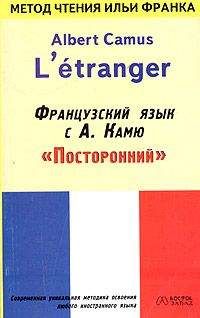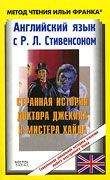Роберт Стивенсон - Английский язык с Р.Л.Стивенсоном. Остров сокровищ
“The man’s a perfect trump (этот человек — славный малый),” declared the squire (заявил сквайр).
“And now,” added the doctor (добавил доктор), “Jim may come on board with us, may he not (Джим может подняться на борт вместе с нами, не так ли)?”
“To be sure he may (конечно, может),” says squire. “Take your hat, Hawkins, and we’ll see the ship (бери свою шляпу, Хокинс, и мы /пойдем/ посмотрим корабль).”
discovery [dɪs`kʌvərɪ] general [`ʤenəral] declared [dɪ`kleəd]
“Well, squire,” said Dr Livesey, “I don’t put much faith in your discoveries, as a general thing; but I will say this, John Silver suits me.”
“The man’s a perfect trump,” declared the squire.
“And now,” added the doctor, “Jim may come on board with us, may he not?”
“To be sure he may,” says squire. “Take your hat, Hawkins, and we’ll see the ship.”
Chapter IX (глава 9)
Powder and Arms (порох и оружие)
THE Hispaniola lay some way out (Испаньола лежала довольно далеко /от берега/; way — путь, расстояние), and we went under the figureheads and round the sterns of many other ships (и мы прошли /на лодке/ под фигурами на носах кораблей и мимо множества различных кораблей; stern — корма), and their cables sometimes grated underneath our keel (и их канаты иногда скрипели под нашим килем), and sometimes swung above us (а иногда раскачивались над нами; to swing — качать(ся), колебать(ся)). At last, however, we got alongside (наконец, как бы то ни было, мы добрались до судна; alongside — бок о бок, около, вдоль борта), and were met and saluted as we stepped aboard by the mate, Mr. Arrow (и были встречены и поприветствованы, когда ступили на борт, штурманом, мистером Эрроу), a brown old sailor, with earrings in his ears and a squint (загорелым старым моряком, с серьгами в ушах и косоглазием). He and the squire were very thick and friendly (он и сквайр были очень близки и дружны), but I soon observed that things were not the same between Mr. Trelawney and the captain (но я скоро заметил, что дела не были такими же между мистером Трелони и капитаном = но с капитаном сквайр не ладил).
This last was a sharp-looking man (этот последний = капитан был человеком желчным; sharp — острый, хитрый, резкий), who seemed angry with everything on board (который казался раздраженным всем на борту), and was soon to tell us why (и вскоре рассказал нам почему), for we had hardly got down into the cabin when a sailor followed us (так как едва мы спустились в каюту, как матрос явился следом за нами; to follow — следовать, сопровождать).
underneath [ʌndə`ni:θ] earring [`ɪərɪŋ] squint [skwɪnt] observed [əb`zə:vd]
THE Hispaniola lay some way out, and we went under the figureheads and round the sterns of many other ships, and their cables sometimes grated underneath our keel, and sometimes swung above us. At last, however, we got alongside, and were met and saluted as we stepped aboard by the mate, Mr. Arrow, a brown old sailor, with earrings in his ears and a squint. He and the squire were very thick and friendly, but I soon observed that things were not the same between Mr. Trelawney and the captain.
This last was a sharp-looking man, who seemed angry with everything on board, and was soon to tell us why, for we had hardly got down into the cabin when a sailor followed us.
“Captain Smollett, sir, axing to speak with you (капитан Смоллетт, сэр, хочет поговорить с вами; axing = asking; to ask — спрашивать, просить /разрешения/),” said he. “I am always at the captain’s order (я всегда к услугам капитана). Show him in (проведите его /в каюту/),” said the squire.
The captain, who was close behind his messenger (капитан, который был сразу за своим посланником), entered at once, and shut the door behind him (вошел тотчас и закрыл за собой дверь).
“Well, Captain Smollett, what have you to say (ну, капитан Смоллетт, что вы скажете)? All well, I hope (все в порядке, надеюсь); all shipshape and seaworthy (все в полном порядке и пригодно для плавания; worthy — достойный; заслуживающий (чего-л.); подходящий, подобающий)?”
“Well, sir,” said the captain, “better speak plain, I believe, even at the risk of offence (лучше говорить прямо, я думаю, даже если с риском оскорбления = рискуя поссориться с вами). I don’t like this cruise (мне не нравится это плавание); I don’t like the men (не нравятся люди); and I don’t like my officer (и мой помощник). That’s short and sweet (вот коротко и ясно; sweet — сладкий; пресный /о воде/).”
“Perhaps, sir, you don’t like the ship (может, сэр, вам и корабль не нравится)?” inquired the squire, very angry, as I could see (спросил сквайр очень разгневанно, насколько я мог видеть).
“I can’t speak as to that, sir, not having seen her tried (не могу говорить об этом, сэр, не видев ее /шхуну/ в плавании; to try — пробовать, испытывать),” said the captain. “She seems a clever craft; more I can’t say (она выглядит ловким судном = построена неплохо; большего сказать не могу).”
seaworthy [`si:wə:ðɪ] cruise [kru:z] inquired [ɪn`kwaɪəd] craft [krɑ:ft]
“Captain Smollett, sir, axing to speak with you,” said he. “I am always at the captain’s order. Show him in,” said the squire.
The captain, who was close behind his messenger, entered at once, and shut the door behind him.
“Well, Captain Smollett, what have you to say? All well, I hope; all shipshape and seaworthy?”
“Well, sir,” said the captain, “better speak plain, I believe, even at the risk of offence. I don’t like this cruise; I don’t like the men; and I don’t like my officer. That’s short and sweet.”
“Perhaps, sir, you don’t like the ship?” inquired the squire, very angry, as I could see.
“I can’t speak as to that, sir, not having seen her tried,” said the captain. “She seems a clever craft; more I can’t say.”
“Possibly, sir, you may not like your employer, either (возможно, сэр, вам не нравится также ваш наниматель)?” says the squire.
But here Dr. Livesey cut in (но тут доктор Ливси вмешался).
“Stay a bit (погодите: «остановитесь немного»),” said he, “stay a bit. No use of such questions as that but to produce ill-feeling (нет пользы из подобных вопросов, кроме = так вы лишь поссоритесь; to produce — производить, вызывать; ill-feeling — враждебность, неприязнь: «дурное чувство»). The captain has said too much or he has said too little (капитан сказал слишком много или же слишком мало), and I’m bound to say that I require an explanation of his words (я обязан сказать, что требую объяснения этих слов). You don’t, you say, like this cruise (вам не нравится, вы говорите, это плавание). Now, why (итак, почему)?”
“I was engaged, sir, on what we call sealed orders (я был нанят, сэр, на условиях, которые мы называем «запечатанными приказами/указаниями»; seal — печать), to sail this ship for that gentleman where he should bid me (вести это судно для этого джентльмена, куда он мне прикажет),” said the captain. “So far so good (пока все хорошо/ладно: «так далеко — так хорошо»). But now I find that every man before the mast knows more than I do (но теперь я убеждаюсь, что каждый простой матрос: «человек перед мачтой» знает больше /о цели путешествия/, чем я). I don’t call that fair, now, do you (я не называю это честным/справедливым, а вы? = а это уже, по-моему, непорядок, как по-вашему)?”
employer [ɪm`plɔɪə] produce [prə`dju:s] explanation [əksplə`neɪʃn] engaged [ɪn`geɪʤd]
“Possibly, sir, you may not like your employer, either?” says the squire.
But here Dr. Livesey cut in.




